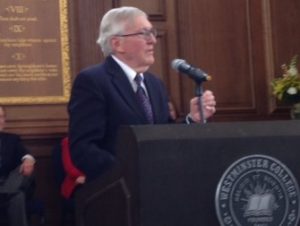This Commentary is written by Jack Bernard and Dr. William Elsea
The following statistic shocked us, even as jaded as we may be:
The U.S. 2014 infant mortality rate was 70 percent higher than that of other wealthy nations, all of which have national health care. It also indicated that American children had a 57 percent greater risk of death here, though that is partly caused by high mortality in the United States related to automobiles and guns.

The primary job of a Georgia local health director is to define the health needs of our community and then ensure that these needs are met. A closely related task is to inform the community of these health care needs and systemic shortfalls.
One key to success is ensuring that our residents are aware of problems so they can take unified action to resolve issues and ameliorate mortality and morbidity issues. In a democracy known for its high ideals, permitting innocent children to suffer and die because their families cannot afford care is simply inexcusable. This unacceptable situation goes directly against our basic sense of morality as Americans.
But the problem is far broader than just children. Our adult population has a higher morbidity and mortality rate than those in other countries. In general, U.S. health care lags far behind other democracies in regard to access, as well as cost containment.
Just as disturbing is the fact that Georgia and other Southern states have an even worse health status than the nation as a whole. We must recognize this fact before we can solve the problem.
It’s disturbing to have prominent people state that U.S. care is the best in the world, ignoring facts, and that “socialized medicine” as practiced in every other democracy is somehow lacking.
There would be no communistic takeover of medicine under Sen. Bernie Sanders’ recently revived Medicare for All Act of 2019 program, as some legislators have implied in the past. Sanders is a supporter of the democratic socialism seen in advanced countries, not the repressive form imposed in dictatorships.
Under the Sanders plan, you could still go wherever you wished for treatment, with the vast majority of physicians and hospitals accepting government reimbursement and a small number accepting only private pay (similar to U.S. “concierge medicine’’ now). That’s why the bill is co-sponsored by 14 of Sanders’ colleagues and endorsed by 65 organizations.
Let’s look at some other mistaken notions that many politicians promulgate about single payer (expansion of Medicare to cover all ages), starting with cost. We can’t just continue with what we have now, as industry interest groups would have you believe.

In the 1970s, health care spending as a portion of total GDP was 7 percent. It is now an astounding 18 percent and expected to hit 20 percent by 2026.
Clearly, spending under our current system is out of control. In part, rising costs are due to our citizens delaying necessary preventive and primary care until an expensive medical crisis arises.
To give us perspective, let’s look at the figures for other major nations, all of which have universal coverage. In 1970, their average spending was 5 percent of GDP, relatively close to our 7 percent. In 2017, it was 11 percent compared to 18 percent here.
Increased health care spending is causing our nation to delay vital public/private investments in education, roads, bridges, technology and other areas. All the while, our mortality and morbidity rates surpass those of other developed nations. Isn’t it time to try another approach, like Sanders’ Medicare for All?
There are a variety of ways to finance single payer that will make it actually less expensive overall than what we have now. First, Medicare administrative costs are only 2 percent to 3 percent versus 12 percent or more for private insurance firms.
Yes, taxes will go up for some, but there will no longer be deductibles and premiums off-setting expenses for many citizens. Plus, there will no longer be medical bankruptcies, the largest cause of total bankruptcies.

Under Medicare for all, our overall national health care would improve, via better access, planning, and standards. Further, with the future addition of universal budgeting and cost control in areas like drug pricing, costs will be contained while everyone is covered. Now it is up to each of us to pressure our state and national elected officials to understand the facts and act now, not later.
Jack Bernard, former Georgia Director of Health Planning, is a retired senior vice president with a national health care corporation and a Fayette County Board of Health member. William R. Elsea, M.D., was Fulton County health commissioner, president of the National Association of County and City Health Directors, and a professor at Emory Medical School.

